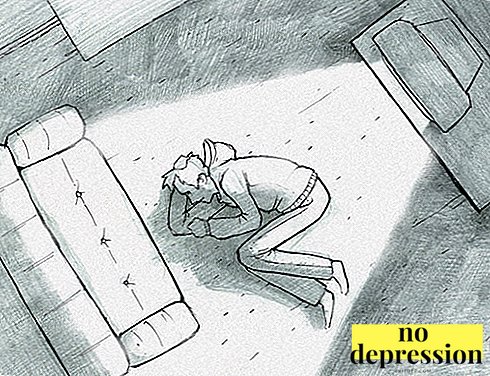I thought that it would be nice to dilute my long articles with something lighter and a little less serious than usual with text. And so I decided to write about the experiment that I recently put on myself.
The experiment was to sit for a few hours at the workplace and do nothing at all (I have this opportunity at work).

At first glance, it seems simple to someone, but you try to sit like that for at least half an hour. Unplug mail and other means of communication, move over in a chair and just sit. This will not be so easy.
I know how important it is to keep informational hygiene, to give your brain a rest from information. I regularly meditate, walk alone or just lie in bed, relaxing, looking at the ceiling. I try to compensate for the hours of information work, Internet work, time of rest and inaction.
This is what maintains my intellectual tone and allows new thoughts and ideas to be born in a head free from new impressions and information.
Of course, on weekends there are a lot of activities that I want to devote time to, so I can not say that I spend a lot of time alone with myself. And it was quite difficult for me to sit for 4 hours, without doing anything at all, in the office, despite my regular meditation classes.
The complexity of the experiment
The situation was aggravated, firstly, by the fact that sitting in a chair in front of the monitor, when the staff scurried around, it was difficult to relax. And when it is difficult to relax, all the time I want to do something with myself. Secondly, I used to work at work. Work on the site, for example. Or just sit with something to do at the computer.
I sit in four walls alone with my monitor and the Internet while at work. Therefore, it is logical to assume that, in the absence of the opportunity to leave the workplace, go home, lie down to relax, all attention begins to automatically riveted to the monitor.
Of course, I do not want to say that in such a situation it is impossible to relax and give your head a rest, it is just more difficult to do it.
The beginning of the experiment
I looked at my watch and decided to what time I would not do anything. It turned out only 4 hours. From the very beginning I understood that it would not be easy, despite the fact that I force myself to periodically go out and just rest. But before the rest for 4 hours it did not reach.
Before that, I often used such a holiday as an “idea generator” or “memory stimulator”. I relaxed and just looked into the void. After some time, new ideas could come to me. Or I could remember what I had to do. For example: "Well, a good idea for an article" or "I need to go to the bank today, it's good that I remembered that."
After that, I started to implement ideas that came to my mind, doing things that I remembered or just doing something else.
But that day I made a firm promise not to do anything. Whatever thoughts came to me, whatever I remembered, I shouldn’t have to violate this persuasion. I was allowed to write down the thoughts, so as not to forget later, but nothing more.
The first 20 - 30 minutes of the experiment was the time of "braking". Before that, I worked, and it took my brain some time to move from an energetic mode of work to a rest mode.
At this time, the temptation to distract something is most strongly observed, since the brain is still strongly “overclocked”, but at the same time, it does not receive new information. Therefore, discomfort occurs due to the lack of information. The brain takes time to stop.
This period you just need to endure and not pay attention to the temptations. And then, sooner or later, thoughts will calm down and the "internal motor" will slow down its course.
It happened, it became easier and somehow I relaxed ...
The middle of the experiment
My seat in the chair was interrupted only by going to the toilet. I also allowed myself to go out. I noticed that my steps became smoother, the walk was slow, I didn’t hurry anywhere and entered into a very measured rhythm.
I understood how a lot of time actually contains one single day. I sat without class for less than an hour, but the time dragged on. Over this time span, many thoughts swept through my head. Where does all this time go? Why do we not notice him?
Sitting on the spot, I looked out the window at the falling snowflakes against the gray wall of the neighboring building. I thought that, despite the fact that the picture is rather monotonous, every fraction of a second it changes, and at every moment the position of the snowflakes becomes what it will never be again! It turns out that whenever I look out the window on a snowflake, I will always see a unique and unique picture there.
…
It seems as if a change occurred in the environment (although I understand that the change actually took place inside of me). It was like a moment from the movie "Peaceful Warrior" when a teacher who taught a student some kind of adapted form of Buddhism applicable in sports showed him that something was constantly happening around him, introducing the student into a special state of consciousness.
Yes, surrounding sounds, colors and smells began to be heard abruptly: he heard the sound of kisses of a couple of students under a tree, he noticed every movement of the dog catching the ball on the lawn: he saw her saliva emit, he heard her teeth click ... As if all the events around, which he had not noticed before, became more significant, noticeable. It’s as if things around him have become more powerful, so to speak ...
Although it just changed his perception.
Similar things happened to me an hour or more after the start of the experiment. I began to notice what my colleagues are doing. I heard one of them quietly talking on Skype, most likely, with someone from his family. I realized that he always did this, but I hardly noticed it. The memory of this was deposited in me somewhere deep in the psyche, but this information never reached consciousness.
I walked around the office space. In the corridor, through which I pass daily dozens of times when I go for lunch, to the street, to other parts of the office, I found cabinets, from the top of which were quite large soft toys. Next to the cabinets was a long row of fire extinguishers going deep into the corridor.
I only then thought that it was a rather unusual picture for the office. Why are there so many fire extinguishers? Where are the soft toys? Most likely, this is due to numerous moves and changes in the layout of the office, and the toys are left from past marketing campaigns.
And again, I realized that all these things are here for a long time, I just did not notice them, because my attention was always directed inside me and not outside: I thought about some problems, thought about the work I was doing at that moment but didn’t pay much attention to things around me.
The environment seemed to come alive. I clearly heard the office’s late afternoon silence broken by a lazy keyboard knock, mouse clicks, quiet cues and rare steps ...
Everything around me has become stronger. This discovery made the experiment more interesting. I enjoyed the new sensations and at some time even forgot about the time ...
End of experiment
The feeling of time began to remind myself at the end of the experiment. When there were only forty minutes left, I remembered that this is the standard duration of a school lesson. It was a very short time, but I already caught myself thinking that I wanted to start my normal activities as soon as possible and was waiting for this time to pass.
I looked at my watch more and more often (“in my next experiment I will set an alarm and forbid myself to look at time” - I thought). I clicked on the browser icon exactly at the minute of the end of the experiment, that is, I did not wait any longer, since I could not cope with impatience.
I opened the site admin panel and started responding to new comments. After I finished this, I quit my job. On the way home, the heightened sense of external reality did not disappear.
I literally plunged on a cloudy winter day. The space around was filled with a battle of bells of a church nearby. The bells first took one note, then, with an interval of 10 - 15 seconds, they took another.
This ringing did not look like an ordinary ordered melody, but was rather like some kind of avant-garde piece of music.
I came back the way I come back from work every day. But today it was all new and around me and within me.
The thoughts in my head were freer than usual at this time. As a rule, after work, my thoughts were riveted to some object: I thought that I had time to do it, summed up the day, "digested" my impressions, recalled events ... But now thoughts were formed easily and spontaneously. As if my mind had escaped from the routine and was just resting.
How can I use this state?
I really liked this experiment, and now I plan to spend more hours of inactivity for myself.
Many people very rarely “get out” of their minds, from endless worries and thinking about problems. Their eyes are always directed inward: they always think about something and do not notice what is happening around.
How can some valuable solution come to your mind when it drowns in a routine and sees nothing beyond immediate problems? Such a mind is like a man who constantly looks only at his feet and does not see anything in front of or behind himself.
Relax and let your brain rest at least sometimes. Inaction will allow your mind to escape from the routine and look at yourself and your life from a perspective. Such a state will allow you to see how much is happening around and how rich this world is!
It can serve as a "catalyst of creativity" for you. Therefore, I recommend to conduct this experiment on yourself, those people who have difficulty in the field of creativity or in decision-making. Sit a few hours without work. No need to think about coming up with ideas. Relax and ideas will come to you yourself.
Inaction is a useful exercise for dealing with bad habits. Indeed, for many people, cigarettes and alcohol are one of the ways to combat the "lack of information." People smoke and drink, including when they have nothing to do. Learn to exist in conditions of information deficit.
If you want to put down on such an experiment, then at the time of its holding, ban yourself smoke breaks. You must learn to be alone with yourself in the absence of any external stimuli and usual activities. If you learn this, it will be much easier to handle bad habits.
I would also recommend this exercise to people who suffer from attention deficit.



